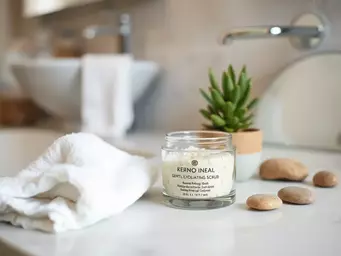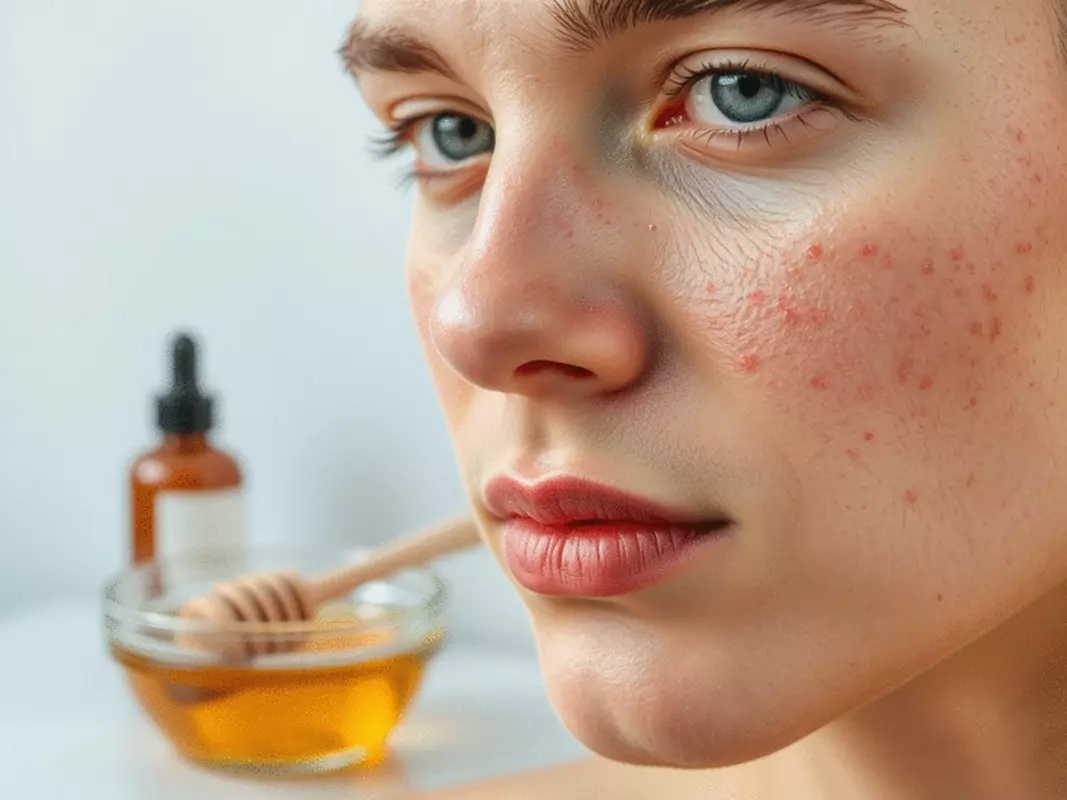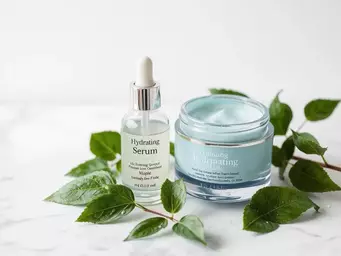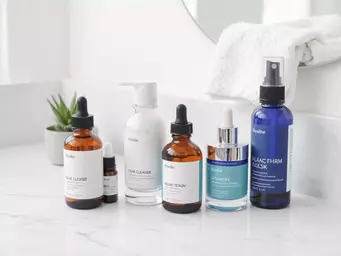Hyaluronic Acid for Dry Acne
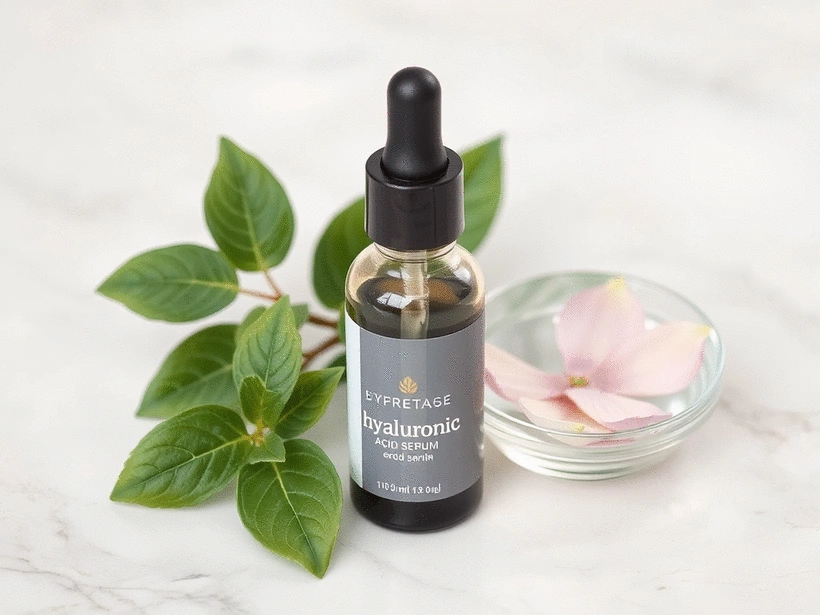
Have you ever wondered how a single ingredient can revolutionize your skincare routine? Hyaluronic acid is renowned for its exceptional ability to hydrate and improve skin health, especially for those struggling with dry acne-prone skin. Let's delve into the key takeaways that reveal why this powerhouse ingredient deserves a place in your daily regimen.
What You Will Learn
- Hyaluronic acid holds up to 1,000 times its weight in water, making it essential for deep hydration.
- It acts as a humectant, drawing moisture from the environment to keep skin plump and hydrated.
- Incorporating hyaluronic acid can help prevent excess oil production, reducing the likelihood of breakouts.
- This ingredient has anti-inflammatory properties, helping to soothe redness and irritation associated with acne.
- A strong skin barrier fortified by hyaluronic acid lowers the risk of acne flare-ups and enhances skin resilience.
- Regular use leads to noticeable skin improvements, including enhanced hydration and a healthier complexion.
- Choose non-comedogenic hyaluronic acid products to ensure they won’t clog your pores while providing hydration.
Key Aspects of Hyaluronic Acid for Dry Acne Skin
Hyaluronic Acid offers several benefits for individuals with dry, acne-prone skin, focusing on hydration, anti-inflammatory properties, and barrier strengthening.
Hydration Power: 1,000x Weight in Water
Hyaluronic acid can hold up to 1,000 times its weight in water, vital for plump, hydrated skin.
Dual Action: Hydration & Anti-Inflammatory
HA deeply hydrates, reducing oil overproduction, while also soothing redness and irritation in acne-prone skin.
Skin Barrier Fortification
HA strengthens the skin's protective layer, making it more resilient against external irritants and bacteria, reducing breakouts.
Integration & Application
- Serums, Moisturizers, Masks: Various forms available.
- Apply on Damp Skin: Maximizes moisture absorption.
- Non-Comedogenic: Essential for acne-prone skin.
Complementary Treatment
HA complements traditional acne treatments (e.g., retinoids, salicylic acid) by counteracting their drying effects, ensuring balanced hydration.
Understanding the Role of Hyaluronic Acid in Skincare for Dry Acne Skin
As someone who has spent years in dermatology, I can tell you that one ingredient consistently stands out for its incredible benefits: hyaluronic acid. Whether you're grappling with dryness, battling acne, or both, this powerhouse ingredient deserves a spot in your skincare routine. Let’s explore what hyaluronic acid is and why it’s essential, especially for those of us with dry acne-prone skin.
What is Hyaluronic Acid and Why is it Important?
Defining Hyaluronic Acid in Simple Terms
Simply put, hyaluronic acid is a naturally occurring substance in our bodies, particularly in our skin. It acts like a sponge, holding onto moisture and keeping our skin plump and hydrated. Think of it as a hydration magnet that pulls water into your skin, which is vital for maintaining a youthful and vibrant complexion.
The Natural Hydration Power of Hyaluronic Acid
The beauty of hyaluronic acid lies in its remarkable ability to hold up to 1,000 times its weight in water! This means it can help your skin feel refreshed and revitalized without causing any heavy buildup. For those dealing with dryness and acne, this is a game changer. It’s like giving your skin a refreshing drink of water every time you use it!
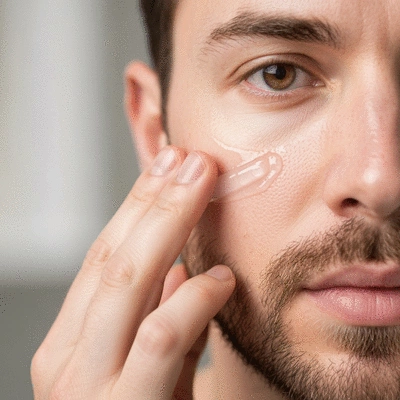
Hydration Benefits of Hyaluronic Acid for Acne-Prone Skin
How Hyaluronic Acid Enhances Skin Hydration
One of the primary benefits of incorporating hyaluronic acid in your skincare is its ability to deeply hydrate the skin. When applied, it penetrates the skin layers, providing essential moisture where it’s needed most. This is particularly important for acne-prone skin, as hydration can prevent the overproduction of oil that often leads to breakouts.
The Impact of Moisture on Acne Management
Keeping your skin adequately hydrated with hyaluronic acid can also minimize the risk of clogged pores. When skin is dehydrated, it may produce excess oil, which can lead to acne flare-ups. By ensuring your skin is well-moisturized, you’re essentially creating an environment that is less friendly to breakouts.
Understanding the Role of Humectants in Skin Hydration
Hyaluronic acid is classified as a humectant, meaning it draws moisture from the environment into the skin. This is crucial for individuals with dry, acne-prone skin because it provides hydration without the heaviness of traditional creams that can clog pores. So, incorporating a hyaluronic acid product can help you achieve that balanced hydration that’s essential for clear skin.
Anti-Inflammatory Properties and Their Effects
Reducing Redness and Irritation with Hyaluronic Acid
Another fantastic aspect of hyaluronic acid is its anti-inflammatory properties. For those of us struggling with acne, redness and irritation can be daily challenges. Hyaluronic acid helps soothe the skin, reducing inflammation and making your complexion appear calmer and more even. Research has shown the potential of hyaluronic acid to reduce inflammation, supporting its use in calming irritated skin.
Supporting Skin Recovery: Wound Healing Benefits
Moreover, hyaluronic acid plays a role in wound healing. When acne lesions heal, they often leave behind scars or marks. By promoting skin hydration and elasticity, hyaluronic acid can support the recovery process, helping your skin to heal more effectively and diminish the appearance of scars. Studies published in sources like PubMed highlight the role of hyaluronic acid in skin repair and regeneration.
Combating Inflammation in Acne-Prone Skin
By integrating hyaluronic acid into your skincare routine, you're not only addressing hydration but also actively combating the inflammation that often accompanies acne. This dual-action approach can lead to a significant improvement in your skin's overall appearance and health.
Strengthening the Skin Barrier Against Acne
The Role of a Strong Skin Barrier in Acne Prevention
The skin barrier is your first line of defense against external irritants and bacteria. When it's compromised, it can lead to increased sensitivity and a higher likelihood of breakouts. Hyaluronic acid helps to fortify this barrier, making it resilient to the challenges posed by environmental factors.
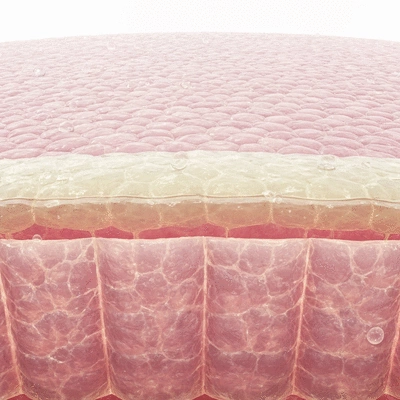
How Hyaluronic Acid Contributes to Barrier Function
By providing hydration and improving moisture retention, hyaluronic acid strengthens the skin's protective layer. A robust skin barrier means less irritation and a lower risk of acne flare-ups. It’s all about creating a healthy foundation for your skin!
Building Skin Resilience: The Importance of a Healthy Skin Barrier
For those of us with dry acne-prone skin, establishing a healthy skin barrier is essential. When your skin feels protected, you’re more likely to engage in healthy skincare practices. Hyaluronic acid can be a critical component of this strategy, enabling you to manage both dryness and acne effectively. A strong skin barrier is vital for overall skin health, as detailed in research findings available on PMC NCBI.
Integrating Hyaluronic Acid into Your Skincare Routine
Product Types: Serums, Moisturizers, and More
Now that you understand the benefits of hyaluronic acid, let’s talk about how to incorporate it into your routine. You can find this ingredient in various forms, including:
- Serums
- Moisturizers
- Sheet masks
Each type offers unique advantages. For example, serums are great for a concentrated dose of hydration, while moisturizers help lock in that moisture.
Application Tips for Maximum Effectiveness
For best results, apply hyaluronic acid on damp skin. This allows it to attract even more moisture from the environment into your skin. Follow it up with a moisturizer to seal in that hydration. This simple step can make a world of difference!
Choosing Non-Comedogenic Products for Acne Management
When selecting hyaluronic acid products, it’s crucial to choose non-comedogenic formulations. This means they won’t clog your pores and will work harmoniously with your skin type. Look for labels that specifically state this to avoid exacerbating your acne.
Long-Term Effects and Considerations of Hyaluronic Acid Use
What to Expect from Regular Use Over Time
Integrating hyaluronic acid into your skincare routine can lead to noticeable improvements over time. Consistent use can result in enhanced hydration, reduced sensitivity, and an overall healthier complexion. It’s not an overnight miracle, but with patience, you’ll likely see positive changes.
Potential Side Effects: Is Hyaluronic Acid Safe?
Hyaluronic acid is generally safe for all skin types. However, some individuals may experience mild irritation or allergic reactions. Always perform a patch test when trying a new product, and if you notice any adverse effects, discontinue use. Your skin's safety comes first!
Understanding Skin Cell Turnover and Its Impact on Treatment
As we use hyaluronic acid, we should also consider our skin's natural cell turnover rate. This process can be affected by our overall skincare routine and lifestyle. Regularly incorporating hyaluronic acid can aid in this process, keeping our skin looking fresh and vibrant.
Comparative Insights: Hyaluronic Acid vs. Other Acne Treatments
Evaluating Efficacy Against Traditional Treatments
When looking at hyaluronic acid in comparison to traditional acne treatments, such as benzoyl peroxide or salicylic acid, it’s important to recognize that hyaluronic acid serves a different purpose. While traditional treatments focus on killing bacteria and unclogging pores, hyaluronic acid hydrates and soothes—key components for managing dry acne-prone skin.
When to Choose Hyaluronic Acid Over Other Options
If you find that your skin is feeling tight or dry due to acne treatments, that’s when hyaluronic acid can be a perfect addition. It can bridge the gap, providing much-needed hydration without worsening your acne.
Comparing Hyaluronic Acid with Retinoids and Salicylic Acid
While retinoids and salicylic acid are effective for treating acne, they can also be drying. Hyaluronic acid complements these treatments by maintaining moisture levels. By using them together, you can create a balanced regimen that targets acne while keeping your skin hydrated and healthy!
Real-Life Experiences: Testimonials and Case Studies
Success Stories: Users Share Their Journeys
Many users have reported significant improvements after introducing hyaluronic acid into their skincare routines. From reduced dryness to fewer breakouts, these real-life stories highlight the positive impact this ingredient can have. Hearing firsthand experiences can inspire you to take that step!
Lessons Learned: Common Misconceptions About Hyaluronic Acid
Some people believe that hyaluronic acid is only for those with oily skin or that it can cause breakouts. However, as we've discussed, it is incredibly beneficial for all skin types, especially dry acne-prone skin. Understanding its true nature can help you embrace its benefits fully.
Pro Tip
To maximize the benefits of hyaluronic acid, always apply it to slightly damp skin. This technique allows the ingredient to attract even more moisture from the environment, enhancing its hydrating effects. Follow up with a lightweight, non-comedogenic moisturizer to lock in that hydration without clogging your pores!
Frequently Asked Questions About Hyaluronic Acid for Dry Acne Skin
- 1. What is hyaluronic acid and how does it benefit dry, acne-prone skin?
- Hyaluronic acid is a naturally occurring substance in the skin that acts as a powerful humectant, holding up to 1,000 times its weight in water. For dry, acne-prone skin, it provides deep hydration without clogging pores, reduces excess oil production, soothes inflammation and redness, and strengthens the skin barrier to prevent breakouts.
- 2. Can hyaluronic acid cause breakouts in acne-prone skin?
- No, hyaluronic acid is generally non-comedogenic, meaning it does not clog pores. In fact, by providing adequate hydration, it can help prevent the skin from overproducing oil, which often leads to breakouts. It's important to choose non-comedogenic products when incorporating hyaluronic acid.
- 3. How should I incorporate hyaluronic acid into my skincare routine?
- Hyaluronic acid is available in various forms like serums, moisturizers, and masks. For maximum effectiveness, apply hyaluronic acid products to slightly damp skin. This allows it to draw more moisture from the environment. Always follow with a moisturizer to seal in the hydration.
- 4. Does hyaluronic acid help with acne scars and inflammation?
- Yes, hyaluronic acid has anti-inflammatory properties that help soothe redness and irritation associated with acne. It also supports the skin's natural wound-healing process, which can help diminish the appearance of acne scars over time by promoting skin hydration and elasticity.
- 5. How does hyaluronic acid compare to traditional acne treatments like retinoids or salicylic acid?
- Hyaluronic acid serves a different, complementary purpose. While traditional treatments focus on clearing acne and unclogging pores, they can often be drying. Hyaluronic acid provides essential hydration and soothing benefits, counteracting the drying effects of stronger acne treatments. Using them together creates a balanced regimen that addresses both acne and skin hydration.
Summarizing the Impact of Hyaluronic Acid on Dry Acne Skin
As we wrap up our exploration of hyaluronic acid and its benefits for dry acne skin, it's important to highlight the profound impact this ingredient can have on your skincare routine. By enhancing hydration, supporting skin recovery, and strengthening the skin barrier, hyaluronic acid addresses the unique challenges faced by those of us with dry, acne-prone skin. Let's dive deeper into why you might want to consider incorporating this powerhouse into your regimen!
Key Takeaways: Why Consider Hyaluronic Acid?
So, what makes hyaluronic acid such an essential part of skincare for individuals dealing with acne? First and foremost, it provides remarkable hydration without clogging pores. This is crucial because well-hydrated skin can significantly reduce the likelihood of breakouts while also promoting a smoother texture. Additionally, hyaluronic acid's ability to retain moisture helps in managing dryness that often accompanies acne treatments.
- Promotes skin hydration without clogging pores
- Supports skin recovery and healing processes
- Strengthens the skin barrier to prevent new breakouts
Moreover, a balanced skincare approach is vital for achieving your skin goals. Integrating hyaluronic acid alongside other gentle, hydrating products can pave the way to healthier skin. At Dry Acne Solutions, we emphasize that each person's skin journey is unique; understanding your specific needs will empower you in making informed choices!
Next Steps: Finding the Right Hyaluronic Acid Products
Now that you're aware of the benefits, let’s talk about how to choose the right hyaluronic acid products for your needs. Quality matters! Look for serums and moisturizers that highlight hyaluronic acid as a key ingredient. It's also helpful to consider formulations that include additional skin-beneficial components, such as vitamins and antioxidants.
- Check for high-quality, dermatologist-recommended brands
- Look for products free from harsh chemicals or irritants
- Consider your skin type and any sensitivities you may have
Don't hesitate to consult with skincare professionals who can provide personalized recommendations tailored to your skin's unique needs. This can save you time and help you avoid products that may not be suitable for your individual situation.
Join the Conversation: Share Your Thoughts and Experiences
As we conclude this discussion, I want to invite you to engage with our community. Have you tried hyaluronic acid in your skincare routine? What has your experience been like? Sharing your insights can help others who are navigating similar challenges. Remember, you're not alone in this journey!
- Comment below to share your thoughts or questions
- Join our online community for discussions and support
- Explore your own skincare journey and discover what works for you
At Dry Acne Solutions, we believe in the power of shared experiences. Together, we can learn, grow, and celebrate our progress towards achieving vibrant, healthy skin!
Recap of Key Points
Here is a quick recap of the important points discussed in the article:
- Hyaluronic acid is essential for maintaining skin hydration and elasticity.
- It helps manage dryness and reduces the risk of acne breakouts by preventing excess oil production.
- The ingredient's anti-inflammatory properties soothe redness and irritation related to acne.
- A strong skin barrier, supported by hyaluronic acid, is crucial for preventing sensitivity and breakouts.
- Use hyaluronic acid products on damp skin and follow with a moisturizer for maximum effectiveness.
- Choose non-comedogenic formulations to ensure they don't clog pores and worsen acne.


